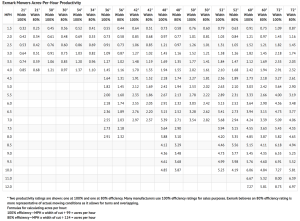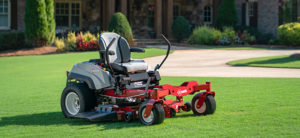Home and acreage owners with one or more acres of property have more choices than ever when it comes to mower type, size, and price, just to name a few. Among landscape maintenance professionals, it’s safe to say the zero-turn riding mower has become the tool of choice to quickly achieve a professionally maintained appearance. However, when it comes to homeowners, are zero-turn mower still the preferred choice?

Learn more about the productivity of Exmark mowers at Exmark.com/Exmark-Advantage/Mower-Productivity-Chart
Productivity: A faster mower = more free time
Landscape pros choose zero-turn mowers because they deliver the finished appearance their clients expect, and they do it more quickly than other mower types. And while it may be true homeowners don’t need to make money with their mowers, it’s a good idea to consider what their time is worth.
We calculated the raw productivity of Exmark zero-turn riding mowers at three price points, along with the productivity of lawn tractors with similar MSRPs. The price ranges examined were:
- $4,000-5,000
- $7,000-8,000
- $13,000-14,000
Learn more about the comparison and criteria used at Exmark.com/Exmark-Advantage/Zero-Turn-vs-Lawn-Tractor.
Productivity of $4,000-5,000 mowers

The Exmark Quest S-Series Front Steer delivers true zero-turn performance in a steering wheel equipped machine that’s ideal for first-time zero-turn mower users.
Whether lawn tractor or zero-turn rider, most mowers in this price range have 48- to 54-inch cutting decks and top speeds of 6-7mph. As a result, raw productivity numbers are close for both types of mowers. In reality however, the differences in maneuverability are greatest in this price range, so the real world productivity gap is typically much larger than the raw numbers suggest. Find out why, and how the mowers in this price range compare, at Exmark.com/Exmark-Advantage/Zero-Turn-vs-Lawn-Tractor.
Productivity of $7,000-8,000 mowers

A 60-inch Exmark Pioneer S-Series zero-turn rider can mow a five acre property in about 1 hour 15 minutes at 80 percent efficiency.
The raw productivity of mowers in the $7,000-8,000 range increases roughly one acre per hour for zero-turn mowers, and one-half acre per hour for lawn tractors, compared to the lower priced models. Within the category, the most productive machine — the Exmark Pioneer S-Series zero-turn rider with a 60-inch cutting deck — can save an acreage owner with five acres more than 20 minutes in mowing time compared to a similarly-priced lawn tractor. Factor in the increased maneuverability of the zero-turn machine and the real world time savings can be much greater. See how each of the mowers in this category stacked up at Exmark.com/Exmark-Advantage/Zero-Turn-vs-Lawn-Tractor.
Productivity of $13,000-14,000 mowers

The incredible productivity of the Exmark Lazer Z X-Series zero-turn mower lets it mow five acres in less than 45 minutes (at 80 percent productivity).
Moving up to the $13,000-14,000 price range, the productivity gap grows significantly. When comparing similar 60-inch cutting deck sizes, productivity for zero-turn riders nearly doubles compared to lower-priced machines. The productivity gap between zero-turn mowers and lawn tractors grows as well. When you factor in the availability of a larger 72-inch cutting deck on the Exmark Lazer Z X-Series zero-turn rider, the productivity gap between the zero-turn mower and lawn tractor further to more than 2.5 acres per hour! Learn more about the productivity of each mower compared at Exmark.com/Exmark-Advantage/Zero-Turn-vs-Lawn-Tractor.
Other factors:
- Maneuverability: Zero-turn riding mowers offer increased maneuverability to mow closer to landscaping, so you spend less time with the trimmer.
- Quality of cut: Landscape pros choose Exmark zero-turn riding mowers for their ability to quickly and consistently deliver an unmatched quality of cut on a wide variety of lawns.
- Durability: Commercial features including welded, fabricated cutting decks, state-of-the-art commercial powerplants and heavy-duty welded, tubular steel unibody frames demonstrate Exmark’s commitment to delivering mowers that are as durable as they are productive.
Bottom Line: Choose the tools the pros use
When compared head-to-head, we believe Exmark zero-turn riding mowers offer the most compelling combination of productivity, maneuverability and quality of cut available today.
Learn more about the advantages of choosing an Exmark zero-turn riding mower at Exmark.com/Exmark-Advantage/Zero-Turn-vs-Lawn-Tractor.
* Productivity rating in gross acres per hour is based on the published specifications for each product. Actual performance may vary from specified performance based on conditions.
Formula for calculating acres per hour at 80% efficiency: (MPH x width of cut in inches)/124







